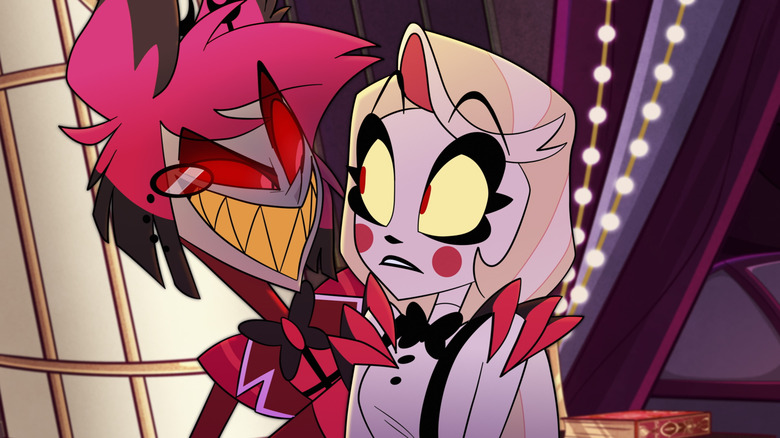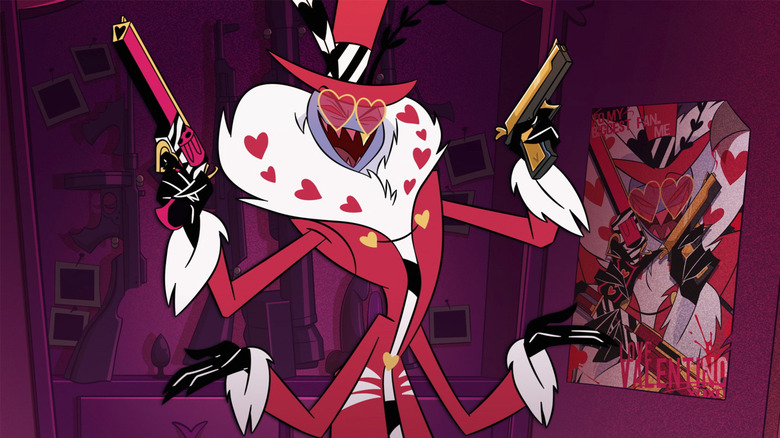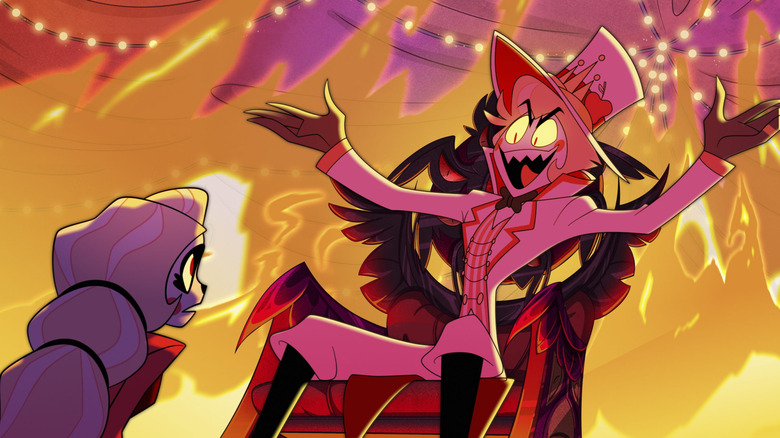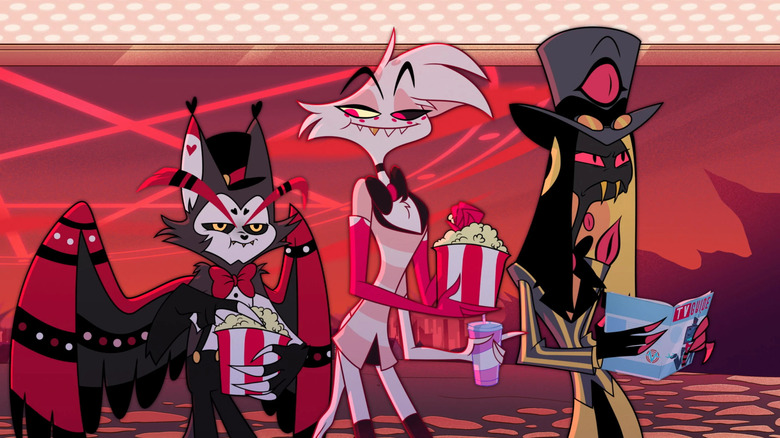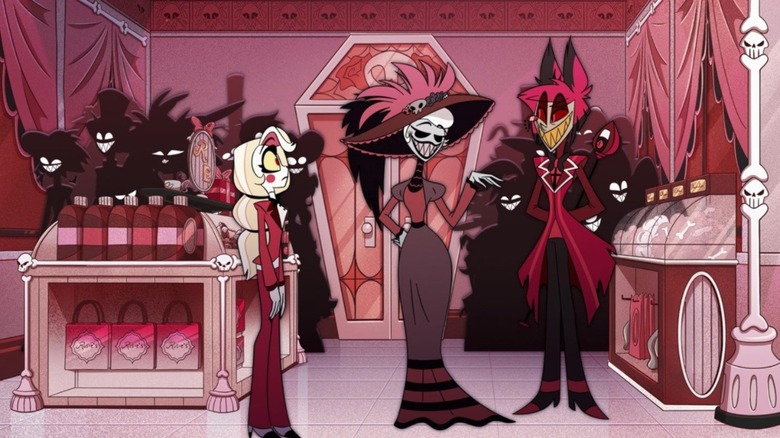Hazbin Hotel Is The Best Example Of What 'Adult Animation' Can Accomplish
At the end of 2022, I was given the Goliath task of explaining to our readers (and much of our staff) why the internet had gone completely feral over the animated design of the Devil Daddy himself, Lucifer Morningstar, on "Hazbin Hotel." Vivienne "VivziePop" Medrano debuted the animated musical pilot for "Hazbin Hotel" on YouTube in 2019, funded entirely by Medrano's Patreon followers and brought to life completely by freelance animators. It quickly went viral and generated a diehard fanbase, one that exists on the fringes of fandom circles and well outside of four-quadrant entertainment.
It's adult animation, but too edgy for the constraints of something like "The Simpsons." It's as raunchy as "South Park," but caters to a queerer audience base. It boasts a Broadway cast as impressive as "Central Park," but without the "Hamilton" name recognition to excite your mom. "Hazbin Hotel" is what happens when you grow up watching "Batman: The Animated Series" and "Invader Zim," listen to show tunes, and spend a lot of time wading through horny Tumblr discourse in the 2010s.
Hell is overpopulated and Heaven has ordered a mass extermination to keep the numbers down. Queer princess of Hell, Charlie Morningstar (Erika Henningsen), wants to take a different approach and tries to rehabilitate sinners in her Hazbin Hotel to allow them a spot in Heaven. Is redemption possible? And why do those jerks in Heaven get to decide what determines redemption?
Shortly after its premiere, it was announced that "Hazbin Hotel" had the largest global debut for a new animated series on Prime Video. There aren't a lot of Cinderella stories in Hollywood anymore, but "Hazbin Hotel" is one of them. I spoke with Sam Haft, one of the co-songwriters for the series, who (like me) is unsurprised by the show's success.
Hazbin Hotel exists outside the Hollywood machine
Sam Haft co-wrote the performance songs of "Hazbin Hotel" with Andrew Underberg, and he's also half of The Living Tombstone (with Yoav Landau), who provided the end credits song for the "Five Nights at Freddy's" movie. That makes Haft the connective tissue between two massively successful projects that got their start as independent creations that organically generated their fanbases. But it doesn't shock him at all that studios are trying to get in on the party.
"I think right now Hollywood is simultaneously very risk-averse and very IP hungry, so I think it's almost an inevitability that studios seek out these creator-driven fandom phenomena, who are the only people who CAN create the sort of franchises they're looking for," Sam Haft tells me. "I think what both 'FNaF' and 'Hazbin' share is that they're more interested in questions than answers — which makes their worlds feel big, but also aren't simply a sandbox — which makes their worlds feel curated and interesting."
Elements of "Hazbin Hotel" aren't all that dissimilar from "Good Omens" or "The Good Place," but I agree with Haft that it's Medrano's refreshing approach to the material and willingness to put characters at the forefront that are often relegated to second banana position on other adult animated shows that keep it feeling unique. For a show designed in 2D, the characters are bursting with layers of nuance, and the worlds of Heaven and Hell are rich with complexities. There's no hand-holding with this world-building, but a roller-coaster ride best enjoyed with arms flailing in the air. "Hazbin Hotel" is a walking contradiction, gleefully screaming infidelities and reveling in sinful behavior while a wholesome, sugary-sweet core simmers at the center. The first song, "Happy Day in Hell," (complete with Henningson's cheery belt-singing mastery) sets not only the tone of the series' approach to storytelling, but the heart of the series itself.
The music will get stuck in your head
There's been an odd trend from Hollywood as of late, where big-budget musicals like "Wonka," "The Color Purple," and "Mean Girls" aren't widely advertised as such. "Hazbin Hotel" is doing no such thing, even teasing the songs from episodes before they go live so fans can add them to their playlists.
The song "Poison" has racked up over 10 million streams on Spotify, Part 1 and Part 2 of the soundtrack took the #1 and #2 spots on the Apple Music charts, and this doesn't even consider the millions of hits on YouTube. The twisted story and NSFW elements blend in harmony with Haft and Underberg's songs, which all play perfectly with the incredibly stacked voice cast. "It helps that Vivienne has such a clear vision for her characters in her head because she does all the hard work during casting to ensure that those actors are really adept at performing those aspects of the characters," Haft explains. "So that if we're writing for [the character of] Charlie, we already know it will work for Erika [Henningsen]."
Joining Henningsen ("Mean Girls") are Stephanie Beatriz ("Encanto"), Alex Brightman ("School of Rock," "Beetlejuice"), Kimiko Glenn ("Waitress," SHE'S THE VOICE OF BABY SHARK!), Darren Criss ("Glee," "Hedwig and the Angry Inch"), Jeremy Jordan ("Smash," "The Last Five Years"), Daphne Rubin-Vega ("Rent," "In the Heights"), and Keith David (He's Keith f***ing David). And these are just the names I think non-theater people might recognize.
Blake Roman as Angel Dust and Amir Talai as Alastor are both absolute triumphs, and I foresee a long and lucrative career in voiceover if they so desire, but you haven't lived until you've heard Keith David sing "Loser, Baby" and remind you that it's okay to suck because there's plenty of people out there who also suck and will love you just as you are.
Prioritizing character over name recognition
"Other than Keith and Daphne, who we really couldn't help thinking about as actors because their voices are SO iconic, we tried not to think about it in terms of actors, but in terms of characters," says Haft. "It was always, 'What does Adam sound like?' instead of 'What does Alex Brightman sound like?'" This character-first approach to the storytelling and musicality brings a level of fluidity often lost when shows incorporate musical numbers. "Hazbin Hotel" follows the time-honored tradition of using music to not only push the story forward but also give deeper insight into the characters' interior lives, so by prioritizing what music lives in the heart of the character, the music becomes intrinsic to the world. "For season 2, we're thinking a lot more about the cast," says Haft, "as it feels like as a TV show goes on, actors and their roles tend to really grow together."
With the denizens of Hell all coming from different time periods and being there for different behavior, their motivations feel completely unique from one another. Charlie's girlfriend Vaggie (Beatriz) is a supportive partner because she shares the same vision, Angel Dust (Roman) wants to get involved because he's working through his own demons (pun intended), and Alastor (Talai) is willing to help mostly out of amusement. This allows a variety of character dynamics to emerge naturally and turns Hell into a playground.
But don't get it twisted: "Hazbin Hotel" is vulgar, mouthy, and definitively not for children. At first, the swearing and barrage of overt sexuality have a bit of an early-2000s edgelord streak, but that exterior slowly breaks down as the show carries on. It feels, at least to me, that "Hazbin Hotel" knows exactly what you think the show is going to be like, and presents it as a sleight of hand distraction while the real adult story is happening underneath.
Invest in independent art
"Hazbin Hotel" is A24's first animated television series, and they were wise to invest in Medrano's vision. All too often, an independent artist creates something impressive outside of the Hollywood system and the response from the studios is to either buy up the indie IP and completely change what made it great in an attempt to appease a larger audience base, or try and replicate the same magic without the creator, and thereby completely losing what made it special. Americanized remakes of international films, whatever the hell M. Night Shyamalan was doing with "Avatar: The Last Airbender," and the boom of the studio indie film after the success of "Napoleon Dynamite" are all perfect examples of this phenomenon.
In less capable studio hands, the series was at serious risk of being sanitized and straight-washed, but A24 allowed Medrano and the rest of the team to raise a little hell and never sacrifice what it is that earned its cult status in the first place. A majority of people spend their entire lives being told that they're going to be banished to eternal damnation for minor transgressions or for simply existing (shout out to my fellow gays), but "Hazbin Hotel" turns Hell into a world of found families and allows a community full of the discarded and looked down upon to thrive. That's precisely what the fandom feels like as well, and that's not something you can replicate.
"Ultimately a studio can't create the next 'Hazbin Hotel' or 'Five Nights at Freddy's' and they've wasted a sh*tload of money trying," Haft explains. "It's a reminder of the importance of the artist's voice."
Season 1 of "Hazbin Hotel" is available to stream on Prime Video.
